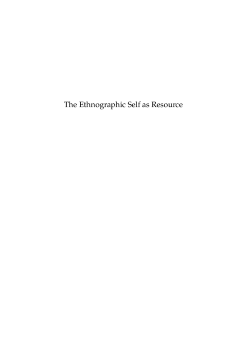
Additional Information
Book Details
Abstract
It is commonly acknowledged that anthropologists use personal experiences to inform their writing. However, it is often assumed that only fieldwork experiences are relevant and that the personal appears only in the form of self-reflexivity. This book takes a step beyond anthropology at home and auto-ethnography and shows how anthropologists can include their memories and experiences as ethnographic data in their writing. It discusses issues such as authenticity, translation and ethics in relation to the self, and offers a new perspective on doing ethnographic fieldwork.
“This book is recommended as useful for anyone writing ethnography in that it acknowledges the difficulties of engaging in anthropology, but also its challenges and rewards compared to other disciplines.” · Anthropological Notebooks
"...an excellent collection of anthropological autobiographical essays focusing on the positionality and resource of the self in ethnography…The essays are engaging and well written…[and] remind me of some of those classic anthropological / ethnographic collections – interesting in their own right to read, but also serving as a good teaching resource." · Amanda Coffey, Cardiff University
Peter Collins received his PhD in Social Anthropology from the University of Manchester in 1994 and is currently Senior Lecturer in the Department of Anthropology at Durham University. He was previously a Lecturer in Development Studies at the University of Manchester. He is the author of numerous articles, and his primary research interests are religion, space and place, narrative theory and qualitative methods.
Anselma Gallinat received a PhD in Social Anthropology from the University of Durham in 2002 and has worked as a Research Assistant and Associate on applied projects. She is currently a Lecturer in Sociology at Newcastle University (UK). She has worked on questions of sociocultural change, narrative, identity, and most recently memory and morality in eastern Germany.
